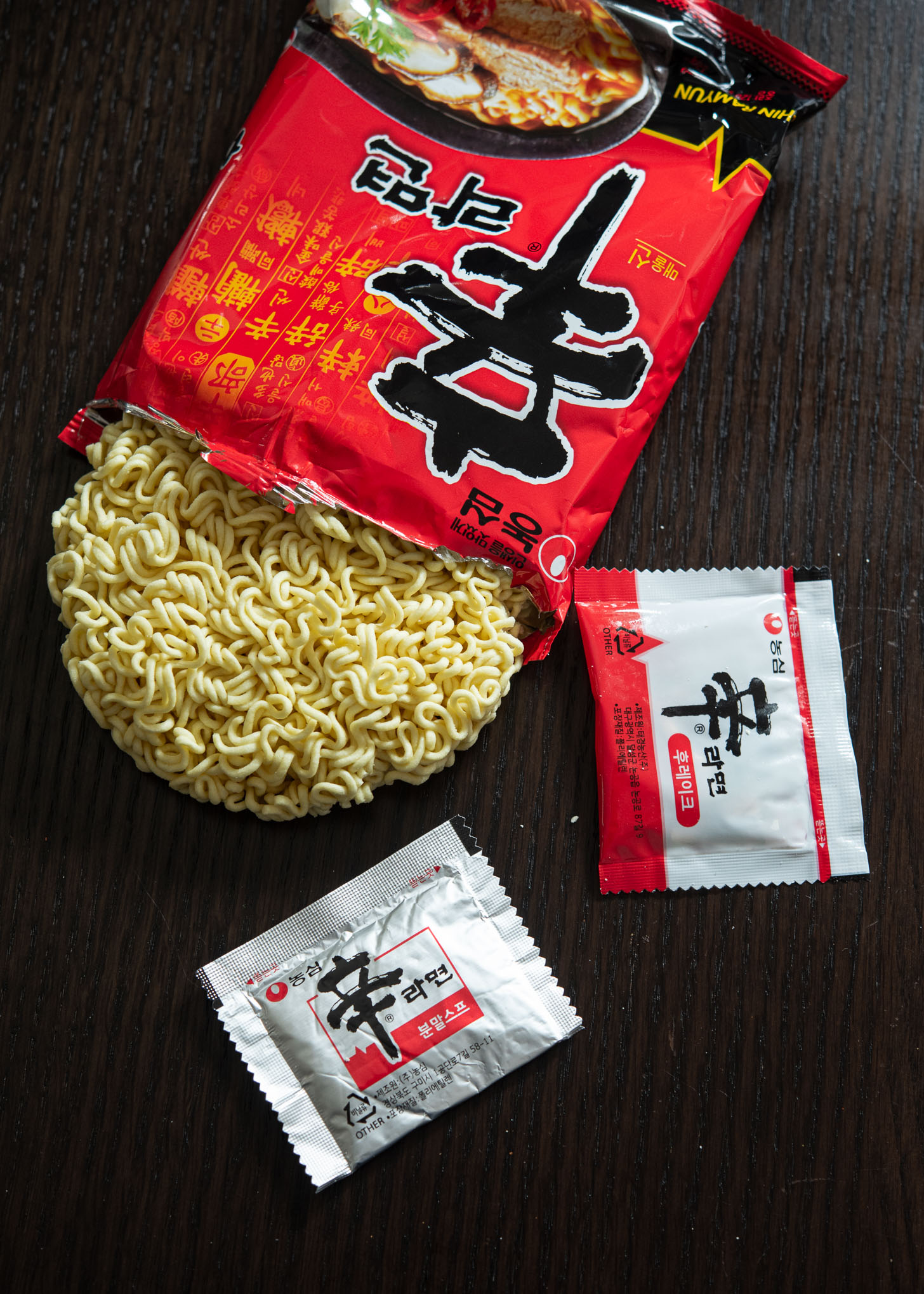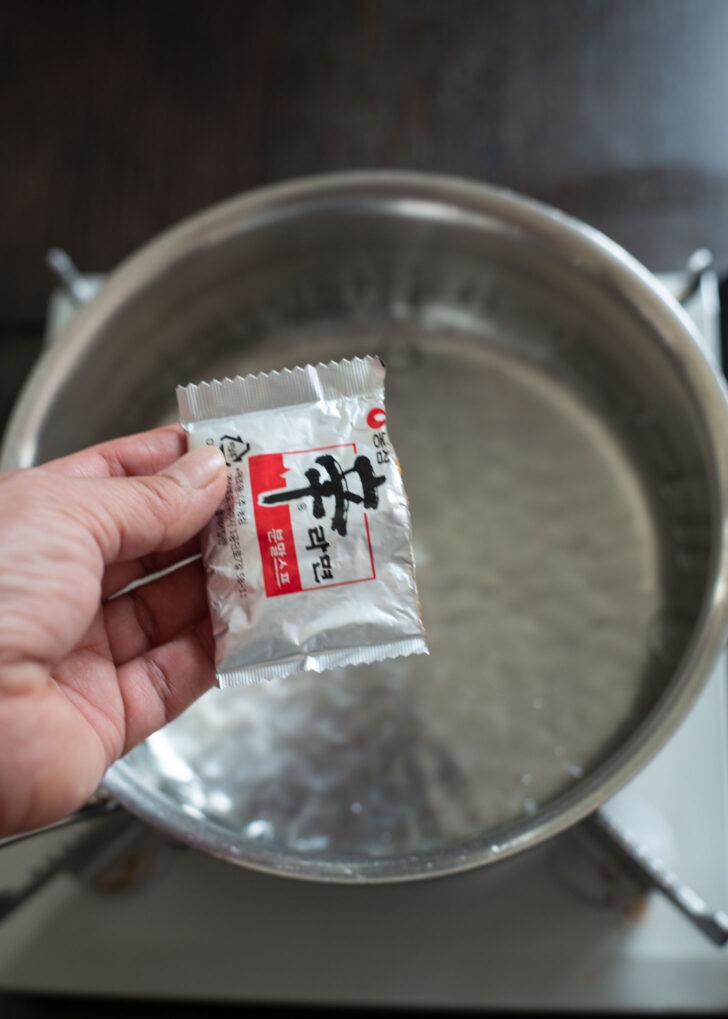5-Minute Kimchi Ramen
Kimchi Ramen transforms instant noodles into a delicious meal in just 5 minutes. Add spicy kimchi and canned tuna for quick and flavorful satisfaction on busy days.

Got Korean instant ramen noodles in your cupboard? Elevate them into a gourmet ramen experience with this simple hack. No need to splurge; it’s that easy!
It’s perfect for college students or busy individuals who are craving quick and tasty meals. This Kimchi Ramen (Kimchi Ramyeon) is the answer!
In just 5 minutes, you can transform sad noodles into a flavor-packed bowl that’ll make you feel like a culinary genius. So why settle for boring when you can have spectacular?
Check out my Gochujang Noodles for another quick and easy noodle meal. This versatile noodle recipe whips up a scrumptious noodle bowl ready in 20 minutes.

Elevate your instant ramen game
Korean instant ramen noodles, ramyeon, provide ample opportunities for creative culinary experimentation. This kimchi ramen recipe is one example of many possibilities. You can also try making these dishes below.
- Crunchy Cabbage Ramen Noodle Salad
- 10-Minute Ramen Stir-Fry with Vegetables
- Budae Jjigae (Korean Army Stew)
This jazzed-up Korean instant ramen is incredibly easy to make and offers a burst of umami flavors.
Sour kimchi and tuna create a harmonious flavor balance, giving this dish its distinct character. All you need to master is boiling instant ramen.

Recipe Tips for Perfect Kimchi Ramen
- Make sure to use the given amount of water in the recipe. Too much or not enough water can alter the taste of soup.
- Use only 3/4 of the seasoning powder in your instant ramen package. Kimchi and tuna already contain salt, and using the entire seasoning powder may result in overly salty noodles.
- The doneness of ramen noodles is a personal preference. If you enjoy chewier noodles, consider cooking them slightly less than what the package instructions suggest.
- If you wish, you can add eggs at the end to increase the protein content.
- Please note that the decision to add eggs is entirely based on personal preference. Personally, I am not a fan of eggs in Korean ramen.

Ingredient List
- Korean instant ramen: Choose any brand you prefer.
- Kimchi: Fermented cabbage kimchi works best.
- Canned tuna: Oil-packed preferred for a richer taste, but water-packed tuna is substitutable. Make sure to drain the liquid.
- Korean chili flakes: to make it spicier (optional)
- Green onion or Asian Leek: Enhances savoriness.
- Sesame oil: Adds savory fragrance and reduces spiciness.
- Toasted sesame seeds: Contributes a nutty flavor (optional).
How to make kimchi ramen


Bring water to a boil over high heat. Add 3/4 of the seasoning powder packet and chopped kimchi.


When the water returns to a boil, reduce the heat to medium. Add the ramen noodles, dried vegetable flakes, canned tuna (about 1/4 to 1/2 amount per serving), and Korean chili flakes (optional).


Use chopsticks or kitchen tongs to lift up the noodles a few times to separate them and ensure even cooking. Cook until the noodles reach your desired doneness, usually around 3-4 minutes.
Turn off the heat, add leek (or green onion), and drizzle with sesame oil and toasted sesame seeds. Serve immediately and enjoy your delicious Kimchi Ramen.

More Noodle Dishes to Try
- Jjajangmyeon: Korean-Chinese noodle dish made with a black bean sauce and vegetables.
- Yaki Udon: Stir-fried Japanese thick udon noodles with vegetables and meat or seafood.
- Japchae: Korean dish made with sweet potato glass noodles stir-fried with vegetables and beef.
- Jjamppong: Spicy seafood noodle soup made with vegetables, seafood, and a spicy broth.
- Sesame Soba Noodles: Japanese buckwheat soba noodles with sesame sauce.

5-Minute Kimchi Ramen
Recipe Video
Ingredients
- 2 1/3 cup (550 ml) water
- 1 package Korean instant ramen
- 1/2 cup (120 ml) chopped kimchi
- 1/2 tbsp Korean chili flakes (gochugaru), optional
- 2 oz (56 g) canned tuna in oil, about half of a 4.5 oz can, drained
- 1 green onion, chopped, or 2 tbsp of chopped Asian leek
- 1 tsp sesame oil
- 1 1/2 tsp toasted sesame seeds
Instructions
- Bring water to a boil over high heat. Add 3/4 of the seasoning powder packet and chopped kimchi.
- When the water returns to a boil, reduce the heat to medium and add the ramen noodles, dried vegetable flakes, canned tuna (about 1/4 to 1/2 amount per serving), and Korean chili flakes (optional).
- Use chopsticks or kitchen tongs to lift up the noodles a few times while boiling to separate them and ensure even cooking. Cook until the noodles reach your desired doneness, usually around 3-4 minutes.
- Turn off the heat, add green onion (or Asian leek), and drizzle with sesame oil and toasted sesame seeds. Serve immediately and enjoy your delicious Kimchi Ramen.
Notes
- Oil-packed canned solid tuna is preferred for a richer taste, but water-packed tuna is substitutable. Make sure to drain the liquid.
- The doneness of ramen noodles is a personal preference, but if you enjoy chewier noodles, consider cooking them slightly less than what the package instructions suggest.

